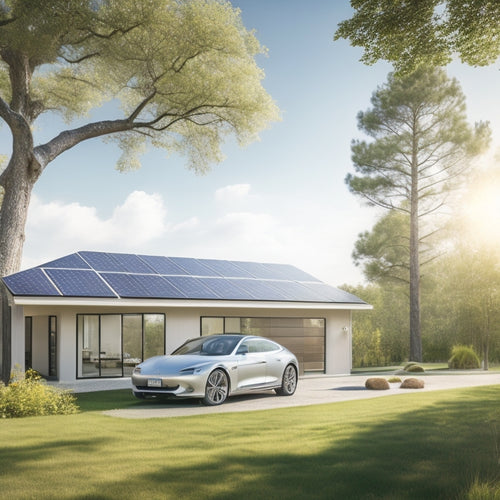
Why Do Solar Panel Warranties Typically Last 25 Years?
Share
You're likely wondering why solar panel warranties typically last 25 years. It's because the International Electrotechnical Commission (IEC) mandates a minimum warranty period of 25 years, ensuring manufacturers adhere to rigorous testing and certification protocols. This confidence comes from using high-quality materials, advanced manufacturing processes, and rigorous testing standards. With a 25-year warranty, you can trust that your solar panels will maintain a minimum power output level of around 80% of initial output. As you explore the world of solar energy, you'll uncover more about what goes into creating reliable, long-lasting solar panels.
Key Takeaways
• The IEC mandates a minimum warranty period of 25 years for solar panels, ensuring manufacturers provide long-term performance guarantees.
• Manufacturers' confidence in their products' quality and durability enables them to offer 25-year warranties without hesitation.
• The use of high-quality materials, advanced manufacturing processes, and rigorous testing standards ensures solar panels can withstand real-world scenarios for 25 years.
• The 25-year warranty period allows consumers to enjoy a reliable source of energy with minimal maintenance and optimal performance.
• The industry's strict quality and performance standards, backed by government oversight, ensure that manufacturers can confidently provide 25-year warranties.
Industry Standards and Regulations
The International Electrotechnical Commission (IEC) sets global standards for solar panel quality and performance, mandating that manufacturers adhere to rigorous testing and certification protocols to guarantee a minimum warranty period of 25 years.
You might be wondering, what's the big deal about these standards? Well, they guarantee that solar panels are built to last, and manufacturers can't just slap a 25-year warranty on any old panel.
The IEC's standards are the backbone of the industry, providing a framework for compliance that manufacturers must follow.
Regulatory bodies, like the IEC, oversee the industry, ensuring that solar panels meet strict quality and performance criteria. This framework provides a safeguard for consumers, giving them confidence in their investment.
When you purchase a solar panel, you're not just buying a product – you're buying into a system that's been rigorously tested and certified.
Manufacturers' Confidence in Products
As you explore the world of solar panel warranties, you'll notice that manufacturers' confidence in their products stems from three key aspects.
They're using high-quality materials that can withstand the test of time, employing advanced manufacturing processes to minimize defects, and subjecting their panels to rigorous testing standards.
These factors combine to give manufacturers the assurance they need to offer 25-year warranties with confidence.
Quality of Materials Used
When evaluating solar panel warranties, you should consider the quality of materials used, which directly correlates with manufacturers' confidence in their products. The quality of materials used can make or break a solar panel's performance and durability. Manufacturers that use high-quality materials are more confident in their products, which is reflected in their warranty periods.
Material sourcing plays an important role in this process. Reputable manufacturers guarantee that their supply chain is strong, sourcing materials from trusted suppliers to guarantee consistency and quality. This attention to detail is vital, as even the slightest variation in material quality can impact the panel's performance.
Advanced Manufacturing Process
Through meticulous attention to detail, manufacturers that employ advanced manufacturing processes demonstrate their confidence in the quality and reliability of their solar panels. By leveraging cutting-edge technologies, manufacturers can guarantee consistency and precision in every step of the production process. This means you, as a customer, can have faith in the performance and durability of your solar panels.
Here are some key aspects of advanced manufacturing processes:
-
Robotics integration: Manufacturers use robots to automate tasks, reducing human error and increasing efficiency.
-
Supply chain optimization: Streamlined logistics and inventory management enable manufacturers to minimize waste and maximize output.
-
Real-time quality control: Advanced sensors and monitoring systems allow for instantaneous detection and correction of any defects or irregularities.
Rigorous Testing Standards
You can rest assured that manufacturers who employ advanced manufacturing processes also subject their solar panels to rigorous testing standards, guaranteeing their products can withstand the harshest environmental conditions. These tests are designed to push solar panels to their limits, simulating real-world scenarios that might make you sweat - think extreme temperatures, humidity, and even hail!
Manufacturers want to assure their products can handle whatever Mother Nature throws at them. To achieve this, they implement strict quality control measures, adhering to laboratory protocols that ensure consistency and accuracy. Think of it as a boot camp for solar panels - only the toughest survive!
By putting their products through this gauntlet, manufacturers can confidently back their warranties, knowing their solar panels will perform flawlessly for years to come. It's no surprise, then, that 25-year warranties have become the industry standard.
With rigorous testing standards in place, you can trust that your solar panels will keep on generating clean energy, no matter what the weather throws at them!
Technology and Durability Factors
As you explore the technology and durability factors that contribute to a 25-year warranty, you'll want to examine the panel material quality, which directly impacts the overall performance and lifespan of your solar panels.
You'll also need to take into account the cell efficiency decline rate, as it affects the energy output over time.
Additionally, you should look into the weather resistance testing that manufacturers conduct to guarantee their products can withstand harsh environmental conditions.
Panel Material Quality
The material quality of your solar panel, which includes its technology and durability factors, plays a crucial role in determining its overall performance and lifespan, with high-efficiency panels typically boasting superior durability and resistance to degradation. You see, a high-quality solar panel is only as good as the materials it's made of. When it comes to silicon purity, for instance, a higher purity level translates to better performance and longer lifespan.
Here are a few key material quality factors to take into account:
-
Silicon purity: High-purity silicon guarantees better energy conversion and longer panel lifespan.
-
Frame durability: A sturdy frame protects the panel from environmental stressors, ensuring excellent performance.
-
Tempered glass or laminate coating: These protective layers shield the panel from the elements, preventing damage and degradation.
Cell Efficiency Decline
Most solar panels experience a gradual decline in cell efficiency over time, primarily due to technological and durability factors. You might wonder, what's behind this decline? Well, it's mainly because of the natural degradation of photovoltaic cells.
As time passes, the cells' ability to convert sunlight into electricity decreases, resulting in energy losses. This degradation is a normal process, but it's essential to understand the factors that influence it. The rate of degradation varies among different solar panels, and manufacturers often provide degradation rates to help you estimate the energy losses over time.
Typically, high-quality solar panels degrade at a rate of around 0.5% to 1% per year. This mightn't seem like a lot, but it can add up over the years. To put it into perspective, a 1% annual degradation rate translates to a 25% energy loss over 25 years. That's a significant drop in energy production!
Weather Resistance Testing
During extreme weather conditions, you'll want to confirm that your solar panels can withstand the elements, which is where rigorous weather resistance testing comes in. You don't want your solar panels to be like the weatherman who can't predict the forecast - unreliable and unpredictable. That's why manufacturers put their panels through a series of tests to make sure they can withstand the harshest of conditions.
Here are some of the ways manufacturers test their solar panels:
-
Climate Simulation:
Manufacturers simulate extreme weather conditions, such as intense humidity, scorching temperatures, and freezing cold, to see how their panels hold up. -
Environmental Exposure:
Solar panels are left outside to face the elements, exposed to rain, hail, and even UV radiation, to mimic real-world conditions. -
Accelerated Life Testing:
Manufacturers speed up the aging process to see how their panels will perform after 25 years of exposure to the elements.
Performance and Efficiency Guarantees
You can expect your solar panels to maintain a minimum power output level, typically around 80% of their initial output, throughout their warranty period, thanks to performance and efficiency guarantees.
This guarantee guarantees that your solar panels will continue to provide a reliable source of energy, even after years of exposure to the elements. In other words, you can count on your solar panels to deliver a consistent energy output, without any sudden dips in performance.
This is important for system reliability, as it allows you to plan your energy consumption with confidence. With a guaranteed minimum energy output, you can rest assured that your solar panels will continue to meet your energy needs, even as they age.
Warranty Period and Maintenance
Your solar panel warranty typically covers a 25-year period, guaranteeing that any defects or malfunctions are addressed promptly, and maintenance is streamlined to minimize downtime and optimize energy production. This extended warranty period allows you to breathe easy, knowing that you're protected from unexpected repair costs.
To make sure your solar panels operate at peak performance, regular inspections are essential. Here are some key takeaways to keep in mind:
-
Regular inspections: Schedule routine checks to identify potential issues before they become major problems. This proactive approach helps prevent energy production losses and reduces the risk of equipment failure.
-
Preventative measures: By addressing minor issues promptly, you can prevent them from escalating into costly repairs. This also helps maintain your system's efficiency and ensures you're getting the most out of your solar panels.
-
Proactive maintenance: Stay on top of maintenance tasks, such as cleaning your panels and inspecting electrical connections, to ensure your system operates at its best.
Consumer Protection and Assurance
Beyond the 25-year warranty, manufacturers and installers provide additional consumer protections that guarantee a hassle-free experience, shielding you from potential risks and uncertainties. This is where customer expectations meet reality. You want to know that your solar panel investment is safeguarded, and manufacturers are committed to delivering on those expectations.
That's why they offer additional guarantees, such as performance guarantees, which secure your system produces the promised amount of energy. Some manufacturers even provide a dedicated customer support team, so you can breathe easy knowing help is just a phone call away.
And, let's not forget about government oversight! Regulatory bodies keep a watchful eye on the industry, ensuring manufacturers adhere to strict quality and performance standards. This added layer of protection gives you peace of mind, knowing you're not alone in this journey.
Frequently Asked Questions
Can Solar Panels Still Produce Power After the Warranty Expires?
You'll be relieved to know that yes, solar panels can still produce power after the warranty expires, albeit with reduced energy output due to natural panel degradation, but still generating some juice for you!
How Does Warranty Duration Impact the Overall Cost of Solar Panels?
You'll be thrilled to know that a longer warranty duration means more cost savings for you, as manufacturers factor in fewer replacement costs, allowing for more aggressive financial planning and a lower overall cost of solar panels.
Are Solar Panel Warranties Transferable to New Homeowners?
When you sell your home, you'll be thrilled to know that most solar panel warranties are transferable to new homeowners, boosting resale value and providing homebuyer benefits, giving you a competitive edge in the market.
What Happens if the Manufacturer Goes Out of Business?
"If the manufacturer goes bust, you're not left high and dry! You've got insurance options to fall back on, and bankruptcy laws will help you recoup your losses - so, breathe easy, you're covered!"
Can I Cancel or Upgrade My Solar Panel Warranty?
You can cancel or upgrade your solar panel warranty, but beware: doing so might void your warranty before its expiration. Research policy flexibility and read warranty reviews to find upgrade options that won't leave you in the dark.
Related Posts
-

Why Invest in Solar Car Battery Chargers Online?
By investing in a solar car battery charger online, you're not only reducing your reliance on fossil fuels but also o...
-

Master Advanced Solar Panel Design Online for Free
You can master advanced solar panel design online for free by leveraging specialized courses and training platforms, ...
-

Planning for an Electric Vehicle-Friendly Urban Future
As you plan for an electric vehicle-friendly urban future, you'll need to integrate high-power charging stations, sma...


